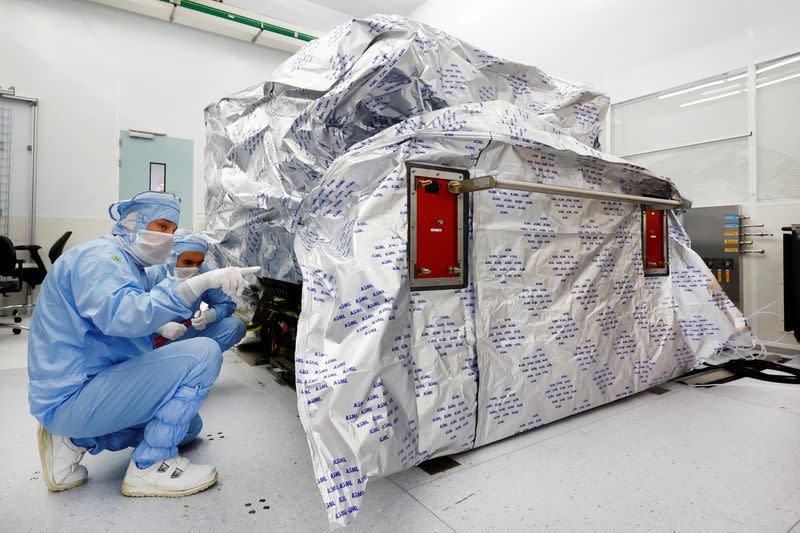Dutch chip equipment giant ASML shipped more than 2 billion euros ($2.2 billion) worth of chipmaking machines to China in the second quarter of this year — worth nearly half of its total sales for the period.
This was the second consecutive month of China accounting for nearly half of ASML’s sales, even as the country’s chipmakers remain restricted from buying the group’s most advanced — and hence, most expensive — chipmaking equipment.
In the first quarter, China made up a record 49% of the group’s total sales, summing up to around 2 billion euros.
Also on AF: The World Needs China’s Legacy Chips, ASML CEO Says
Effectively, ASML has sold at least one in every two of its chipmaking systems to China so far this year.
Those numbers mark a sharp increase in ASML’s sales to China from last year. In 2023, China accounted for only 8% of the firm’s sales in Q1 and 24% in Q2.
The spike in sales comes as Chinese chipmakers escalate their purchases of ASML equipment used to make older generations of chips widely used in cars, refrigerators, smartphones and industrial applications.
Tightening US export sanctions have meant that Chinese chipmakers remain cut off from ASML’s most advanced EUV (Extreme Ultraviolet) and several high-end DUV (Deep Ultraviolet) lithography systems required to make cutting-edge chips.
ASML dominates the market for those lithography systems — complex tools that use lasers to help create the tiny circuitry of computer chips.
While chipmakers in China are trying to use stockpiled DUV systems to produce newer age 7nm and 5nm chips, the process has remained hugely expensive due to lower yields and higher maintenance costs.
The Chinese industry is, thus, investing heavily in expanding production of older chips, known as legacy chips, with help from state subsidies.
China’s largest contract chipmaker Semiconductor Manufacturing International Corporation (SMIC) reported a 20% surge in first quarter revenue this year — largely on the back of legacy chips.
Looming worry of more US curbs
In the short-term, ramping up legacy chip production will help China lessen its dependence on foreign chips — a key goal of the Xi Jinping government.
In the longer term, however, it runs the risk of attracting greater export curbs from Western governments that remain concerned about the potential oversupply of legacy chips.
Early this month, the European Commission began consultations with the region’s semiconductor industry on China’s expanded production of older generation computer chips.
The EU and US may “develop joint or cooperative measures to address dependencies or distortionary effects,” a spokesperson for the Commission told Reuters at the time.
The US, meanwhile, has been sounding the alarm on the matter since at least 2022.
In December 2022, Matt Pottinger, former Deputy US National Security Advisor warned China could end up dominating the legacy chip market by flooding it with cheaper products.
“It would give Beijing coercive leverage over every country and industry – military or civilian – that depend on 28 nanometer chips, and that’s a big, big chunk of the chip universe,” he said.
Unsurprisingly, reports on Wednesday said the US was putting increasing pressure on the Netherlands — which houses ASML — to further restrict exports of chip equipment to China.
Amsterdam-listed shares of ASML tanked more than 8% on the back of the news, even as the firm beat analyst estimates to post revenues of 6.2 billion euros.
“The geopolitical angle… is more likely to be in focus today than the results,” Citi analysts wrote in a note.
Early this year, ASML — Europe’s most valuable firm — warned any expansion of curbs against exports to China will risk its business.
- Vishakha Saxena, with Reuters
Also read:
Beijing Slams US Plan to Review China’s Supply of Legacy Chips
China’s Third Chip Fund Gets $47 Billion to Boost Output
US Curbs Set Off Sales, Tech Boom for China Chip Equipment Firms
China’s AI Chip Firms Downgrade Designs to Keep Access to TSMC
SMIC, Huawei Big Winners as China Ramps Up Chip Funding
Curbs on ASML ‘to Stop Use of Advanced Chips by China Military’
‘Four of Five Huawei AI Chips Defective’ as US Sanctions Bite
Huawei, SMIC Set to Defy US Sanctions With 5nm Chips
Access to China ‘Essential’ as it Develops Chips: ASML CEO
China to Lead 2024 Chip Expansion with 18 New Fabs – SEMI
US Set to Double Tariffs on Chinese Semiconductors in 2025 – TH























